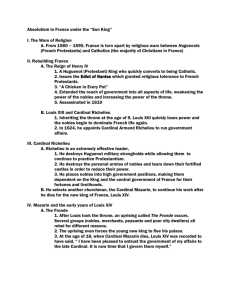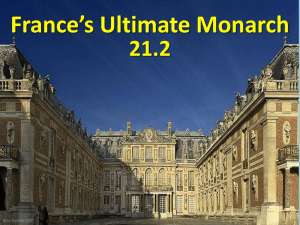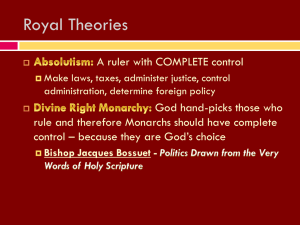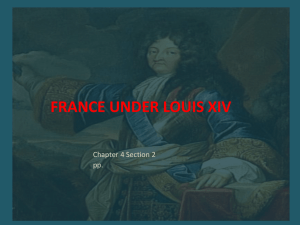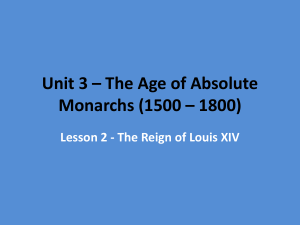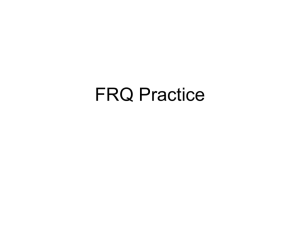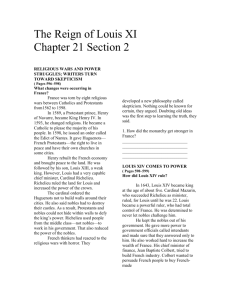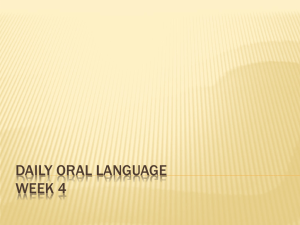my lecture on the Sun King
advertisement
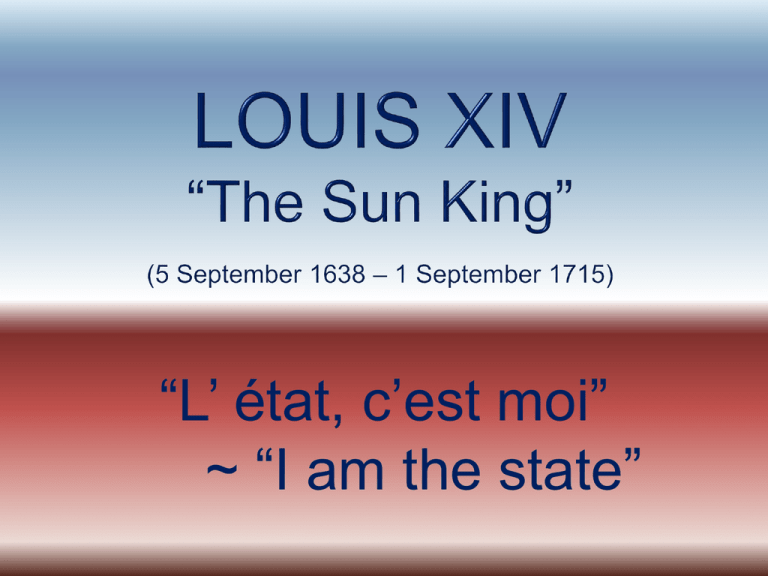
“L’ état, c’est moi” ~ “I am the state” • Introduction • Brief Timeline • Le Fronde • • • • • • • • Law & Order Control Nobles Economic Reform Patronage of the Arts Versailles The Church Army Foreign Policy Through his ambitious political, economic, cultural and religious pursuits, Louis XIV brought built on the legacy of his Capetian predecessors to achieve the centralization of France, French influence in the world, and a perfect absolute monarchy. • • • • • • 1638: Louis born, son of Louis XIII and Anne of Austria 1643: Louis XIII dies, Anne and Mazarin took the regency for the four year old Louis 1648-1653 Wars of the Fronde 1654: At 18, Louis crowned, becomes Louis XIV 1661: Cardinal Mazarin dies => at 23 Louis has personal control over France 1661–1715: Develops Perfect Absolute Monarchy Causes: • Dissatisfaction with taxes- In 1648 Mazarin attempted to tax members of the Parlement de Paris • Protest against their political demotion from vassals to courtiers • Feudal Nobility was threatened by Mazarin and wanted more of a voice in the government. Mazarin fled to Germany • Fear of centralized gov • Disrespect for bureaucracy (the Noblesse de Robe) Effects: → Fronde was defeated → Disorder from the Fronde: Years of fighting, riots and disorder leaves the peasants weary of troubled times. In this way, they are perfectly ready to accept the iron rule of an absolute monarch → Left Louis XIV with distrust of nobles… • • Intendants administered France – country was divided into 32 districts Job of an Intendant • recruit men for army • supervise collection of taxes • preside over administration law • check on local nobility • regulate economic activities • Enforce corvée: forced labor that required peasants to work a month per year on public projects • 3 main advisors • • • • • • Jean Baptiste Colbert - Finance & Navy Michel de Telier – Military Hughes de Lionne – Foreign Affairs Grande Ordonnance de Procédure Civile of 1667, the Code Louis - comprehensive legal code attempting a uniform regulation Law of State / Law of Church Basis for Code Napoleon • • • Nobles tried to gain favor at Versailles Created Secret Police: - spied on nobles - went through mail Compromise with the Nobility • • He doesn’t tax them They can’t complain about how money is spent More and more power to the King • 1661, treasury verged on bankruptcy • Colbert - Contrôleur général des Finances. • Louis first had to eliminate Nicolas Fouquet, the Surintendant des Finances. Fouquet charged with embezzlement. • Mercantilism as means to self sufficiency • Colonies in North America • Customs & Taxes • Inventions • Manufacturing (esp. glass, shipbuilding, and iron) • Infrastructure • Army & Navy 7.Increase tariffs, taxes, and duties to pay for the military and royal estate. 8. Maintain traditional farming 1 9 7 2 8 6.Develop strong infrastructure roads and canals 6 5 4 1.Intervene in the economy, to protect home products, by taxes and tariffs 2.Export of finished products to achieve a positive balance of trade (Revenue for military, arts, infrastructure, etc.) 3 5.Reduction of tolls for national traffic 3.Entrepreneurs est. manufacturing base. 4.Est. colonies and trading partners • Changes Art o o o • • • • No Longer to Glorify God – Middle Ages No Longer to Glorify Human Potential – Renaissance Glorify King and Absolute Rule The Louvre Painters (mostly Italian Baroque): Charles Le Brun, Pierre Mignard, Antoine Coysevox, and Hyacinthe Rigaud Composers: Lully, Chambonnières and François Couperin Writers: Molière (comedies), Racine (tragedies), and La Fontaine (fables) • • • • • • Académie Française Academy of inscriptions and belles-lettres 1663 Academy of Science 1666 Academy of moral and political Sciences 1795 Academy of architecture 1695 Academy of Royale de Musique 1680 → Funds from Finance Ministry • Fronde allegedly caused Louis to hate Paris, which he abandoned for a country retreat. But he beautifies Paris also. So why? • Patronage: Entire French nobility was expected to be present in ceremonies, festivals and dinners – nobles danced and tried to gain favor of the King • Watch for potential Rivals • To leave something glamorous for next generations • Ultimate show of Divine Right, power, and elegance… • • • • • • • • • • • 2,000 acres of grounds 12 miles of roads 27 miles of trellises 200,000 trees 210,000 flowers planted every year 80 miles of rows of trees 55 acres surface area of the Grand Canal 12 miles of enclosing walls 50 fountains and 620 fountain nozzles 21 miles of water conduits 3,600 cubic meters per hour: water consumed • • • • • • • • • • 26 acres of roof 51,210 square meters of floors 2,153 windows 700 rooms 67 staircases 6,000 paintings 1,500 drawings and 15,000 engravings 2,100 sculptures 5,000 items of furniture and objects d'art 150 varieties of apple and peach trees in the Vegetable Garden Gallery of Battles Hall of Mirrors Palace at Versailles The Gardens Bedroom of the Queen Devout Catholic Head of the Gallican Church (French Catholic Church) Anti – Huguenot Campaign • Closing of schools and churches • Excluded from public office • Job Discrimination Edict of Fountainbleau (1685) Repealed Edict of Nantes – rel. toleration to Huguenots ◦ 200,000+ (of 2 million) Huguenots fled to England, Holland, and New England ◦ Many Huguenots belonged to the merchant and artisan classes, they took their knowledge and skills with them… ◦ Huge error - weakened France's economic position (and immoral) • • • • • • • Size • 1635: 25,000 • 1659: 250,000 Loyal to King, not nobles Modernize Organize Professionalize Discipline Morale • • • Wanted control of modern Belgium and Holland Rhine River as eastern border of France Louis’ longest war was the War of the Spanish Succession- lasted from 1701- 1714 • • • almost led to France’s defeat bankrupted the country Wars made him unpopular • • • • What methods did Louis XIV use to consolidate his rule? Identify and describe the Sun King’s successes. Identify and describe the Sun King’s excesses. "One King, one law, one faith”. Mission accomplished? To what extent did Louis XIV achieve the perfect Absolute Monarchy?

